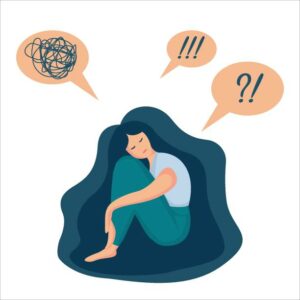If you are someone who has been diagnosed with PTSD, likely, you have also experienced anger issues at some point. It is not uncommon for people with PTSD to feel an intense rage in response to certain triggers. This can be very difficult to deal with, both for the person experiencing the anger and for those around them. In this blog post, we will discuss the link between PTSD and anger, as well as ways to deal with trauma-related rage.
Contents
Defining Anger
Anger is a natural emotion that everyone experiences at different times. It is a normal response to feeling threatened, frustrated, or helpless. Anger can be a positive emotion when it motivates you to take action or stand up for yourself. However, anger can also become problematic when it is out of proportion to the situation, is difficult to control, or leads to harmful behaviors.
Defining PTSD
PTSD, also known as post-traumatic stress disorder, is a mental health condition that can be triggered by a traumatic event. Symptoms of PTSD can include flashbacks, nightmares, anxiety, and depression. For many people with PTSD, anger is also a symptom. PTSD is characterized by intrusive thoughts, avoidance, negative changes in mood and cognition, and hyperarousal.
Anger And PTSD

While it is normal to feel anger after a traumatic event, people with PTSD may experience chronic or long-lasting anger. This can be extremely distressing and make it difficult to function in day-to-day life.
There are a few different types of anger that someone with PTSD may experience:
Interpersonal anger
This is the type of anger that you may feel towards other people. It can be triggered by something that someone says or does, or even by something that reminds you of the traumatic event.
Intrapersonal anger
This type of anger is directed inward, towards yourself. You may feel like you are not good enough or that you deserve the bad things that have happened to you.
Traumatic anger
This is the type of anger that is directly related to the traumatic event itself. It can be triggered by anything that reminds you of the trauma, or even by thinking about the trauma.
It is important to note that not everyone with PTSD will experience anger in the same way. Some may have difficulty controlling their temper, while others may only feel anger in specific situations. Additionally, people with PTSD may experience other emotions that can contribute to feelings of rage, such as fear, anxiety, and sadness.
Symptoms Of Anger In PTSD

There are a few different symptoms of anger that may be experienced in PTSD. These can include:
- feeling easily irritated or angered
- having a short temper
- feeling like you are “on edge” all the time
- being quick to anger
- having difficulty controlling your anger
- engaging in risky or destructive behaviors when angry
- irrational angry outbursts
- exaggerated startle response
- having difficulty concentrating
- sleep problems
- fatigue
- physical symptoms such as headaches, stomach problems, muscle pain, heart palpitations, etc.
Causes Of Anger In PTSD
There are a few different factors that can contribute to the development of anger in PTSD. These can include:
- brain injuries
- changes in brain structure and function
- previous experience with trauma or violence
- not resolving the past trauma and the accompanying stressors
- experiencing a current event that is similar to the past trauma
- poor coping skills
- a lack of support from family and friends
- untreated mental health conditions, such as depression or anxiety
- substance abuse
- exposure to chronic stress
What Does Anger In PTSD Look Like?
Anger manifests itself along with PTSD symptoms in the following ways.
- First, it is important to understand that PTSD can change the way your brain processes information. This means that you may be more likely to see things as threats, even when they are not. This can lead to a feeling of constantly being on edge and feeling like you need to protect yourself all the time.
- Additionally, people with PTSD often have trouble regulating their emotions. This means that they may feel all of their emotions more intensely than someone without PTSD.
- People with PTSD may have a lower threshold for feeling angry and may react more quickly and strongly to triggers than others would.
- PTSD can also often make people feel hopelessness and powerlessness, which can contribute to feelings of rage.
- Moreover, people with PTSD may be more likely to engage in risky or impulsive behavior. This can lead to problems with anger, as well as other types of issues.
Triggers

For people with PTSD, anything can trigger a feeling of anger. These triggers can be related to the original trauma (such as seeing someone who reminds you of the perpetrator) or they can be unrelated (such as being cut off in traffic). Many people with PTSD report feeling “on edge” all the time, which can make it difficult to identify specific triggers.
It is important to note that not everyone will have the same triggers for their anger. What sets one person off may not bother another person at all. It is also possible for a trigger to change over time. For example, a sound that initially did not bother you may start to trigger your anger after you have been exposed to it more often.
Treatment For Anger In PTSD
While it is normal to feel angry in response to a traumatic event, people with PTSD may find that their anger is much more intense and difficult to control. This can be extremely frustrating and scary for both the individual and those around them. It is important to remember that if you are experiencing trauma-related rage, you are not alone. There are ways to deal with this type of anger, which we will discuss below.

- Cognitive-behavioral therapy (CBT): This type of therapy can help you to identify and change negative thought patterns that contribute to feelings of anger.
- Exposure therapy: This type of therapy can help you to process and work through the trauma that is causing your anger.
- Medication: There are a few different types of medication that can be used to treat PTSD, including antidepressants and anti-anxiety medication.
- Support groups: There are many different types of support groups available for people with PTSD. These groups can provide you with a safe space to share your experiences and connect with others who understand what you are going through.
- Self Help Strategies: These can include a variety of activities, such as:
- Identifying your triggers and learning to avoid or cope with them
- Practicing relaxation techniques, such as deep breathing or progressive muscle relaxation
- Eating a healthy diet
- Getting enough sleep
- Avoiding drugs and alcohol
- Channeling your emotions in healthy manners
- Journaling
- Finding a support system of family and friends who can provide emotional support
- Engaging in regular physical activity
- Finding healthy ways to express your anger, such as through writing or art
- Spending time with supportive people
If you are struggling with trauma-related rage, it is important to seek professional help. This is the best way to ensure that you get the treatment that you need. Remember, you are not alone and there is help available.
Conclusion
PTSD and anger can be a difficult combination to deal with. However, it is important to remember that you are not alone and there are ways to get help. These conditions are treatable. If you are struggling with trauma-related rage, please reach out for professional assistance.
For more information, please contact MantraCare. Anger is a powerful emotion that is experienced by every individual at some point in their lives. If you have any queries regarding Online Anger Counseling experienced therapists at MantraCare can help: Book a trial Online therapy session


